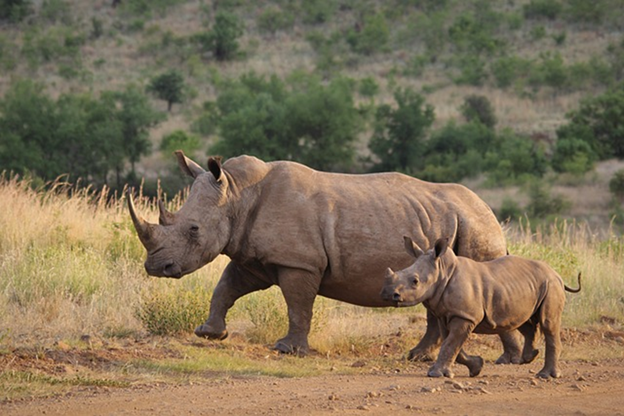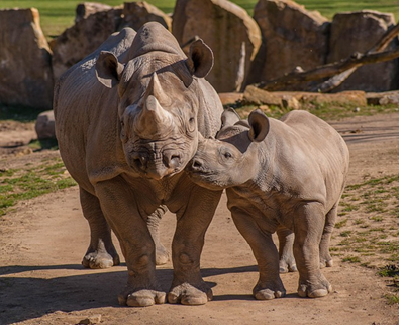August 2025 African Proverb of the Month The rhinoceros that has babies is not bitten on her legs. Sukuma (Tanzania) Proverb
 |
Ingili ya bhana idalumagwa matimba. (Sukuma) Kifaru mwenye watoto hang’atwi miguuni. (Swahili) Le rhinocéros qui a des bébés n’est pas mordu aux jambes. (French) The rhinoceros that has babies is not bitten on her legs. (English) |
Sukuma(Tanzania) Proverb
Background, Meaning and Everyday Use
The Sukuma Ethnic Group is the largest one in the nation of Tanzania which has 130 languages. According to the 2016 Ethnologue: Languages of the World the Sukuma people make 16 percent of the nation’s total population.
These Sukuma people usually impart teachings in their daily lives by using proverbs, sayings, and riddles. They inspire their members enough to unite them together by using a variety of proverbs which encourage them enough to fulfill their economic, social and cultural activities. One of those proverbs says, the rhinoceros that has babies is not bitten on her legs.
The source of this proverb is the rhinoceros that is a wild animal. Her children will always surround their mother thus keeping their mother’s legs always protected against any insect that is likely to harm them on their legs. It is through this kind of protection that people came up with this proverb that the rhinoceros that has babies is not bitten on her legs to communicate the power of children in protecting their mothers against enemies.
Biblical Parallels
Matthew 28:16-20: “The eleven disciples went to Galilee, to the mountain to which Jesus had ordered them. When they saw him, they worshiped, but they doubted. Then Jesus approached and said to them, “All power in heaven and on earth has been given to me. Go, therefore, and make disciples of all nations, baptizing them in the name of the Father, and of the Son, and of the Holy Spirit, teaching them to observe all that I have commanded you. And behold, I am with you always, until the end of the age.””
Mark 3:14-19: “He went up the mountain and summoned those whom he wanted and they came to him. He appointed twelve [whom he also named apostles] that they might be with him and he might send them forth to preach and to have authority to drive out demons: [he appointed the twelve:] Simon, whom he named Peter; James, son of Zebedee, and John the brother of James, whom he named Boanerges, that is, sons of thunder; Andrew, Philip, Bartholomew, Matthew, Thomas, James the son of Alphaeus; Thaddeus, Simon the Cananean, and Judas Iscariot who betrayed him.”
Psalm 127:3-5: “Certainly sons are a gift from the LORD, the fruit of the womb, a reward. Like arrows in the hand of a warrior are the sons born in one’s youth. Blessed is the man who has filled his quiver with them. He will never be shamed for he will destroy his foes at the gate.”

Contemporary Use And Religious Application
This proverb can be compared to a person who has a good number of children enough to support him or her in his or her life. This person is capable of getting help from his/her children in his or her old age. He/she can be likened to the rhinoceros that has children who keep her feet protected from getting stuck. Children ensure the survival of their mother.
This proverb also teaches people on raising their children with sound moralities so that they can take care of them in the future. It encourages them enough to carry on doing good things to their societal members by maintaining their values which unite them together enough to promote peace in their daily lives.
Besides, it teaches societal members on how to take care of their children with the hope that these children will help their parents when they are old. It reminds these children of their obligation to sustain their parents who become old.
This proverb plays a great role in enabling all members of the Catholic Church to recognize their roles in protecting their Mother Church. They can do so through the power of the Holy Spirit who works in each one of them that makes them good people in their lives. These can also actively participate in all the Synodal Processes by uniting all of them enough to walk together on the way to the heavenly kingdom.
This proverb also strengthens the Small Christian Community members by maintaining their unity for helping one another by praying together enough to enable each one respond to his/her call within the Catholic Church of Christ. They do so by answering their missionary baptismal call that of spreading the good news of Jesus to their societal members.
In addition to that, Small Christian Community members are like the children that protected the rhinoceros against enemies because they also protect the Mother Catholic Church against enemies by helping one another enough to live according to God’s commandments on the way to the Heavenly Kingdom. That is why SCC members unite and encourage one another after gathering in their weekly meetings enough to walk together towards God by saying that the rhinoceros that has babies is not bitten on her legs.
No. 572 INGILI YA BHANA IDALUMAGWA MATIMBA in the Sukuma Legacy Project/TLRS https://sukumalegacy.org It includes Swahili and English translations.
See also the Sukuma proverbs in the:
Nanetya Foundation: Ethnic Stories in Mother Tongues Website
nanetya-foundation.org
Text:
Justina Yunge Deus.
Cellphone:
+255710058590.
- O. Box 71, Kishapu, Shinyanga.
Photos:
Rev. Zakaria Kashinje, OSA.
Dar es Salaam, Tanzania
Cellphones:
+255-756-887787 Vodacom
+255-717-3337787 Tigo
+255-786-337787 Airtel
Email: zkashinje@gmail.com
zkashinje@yahoo.co.uk
